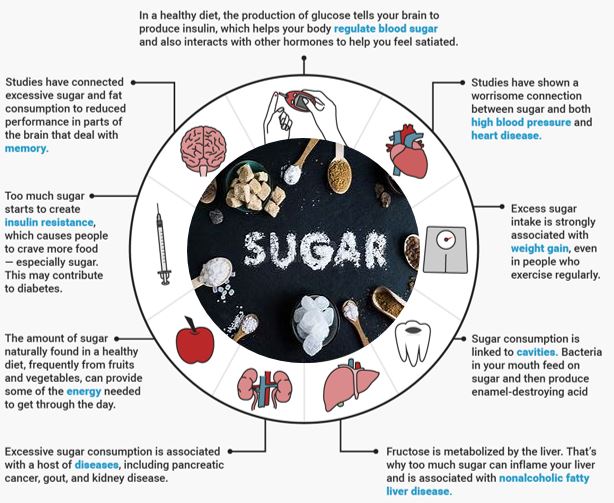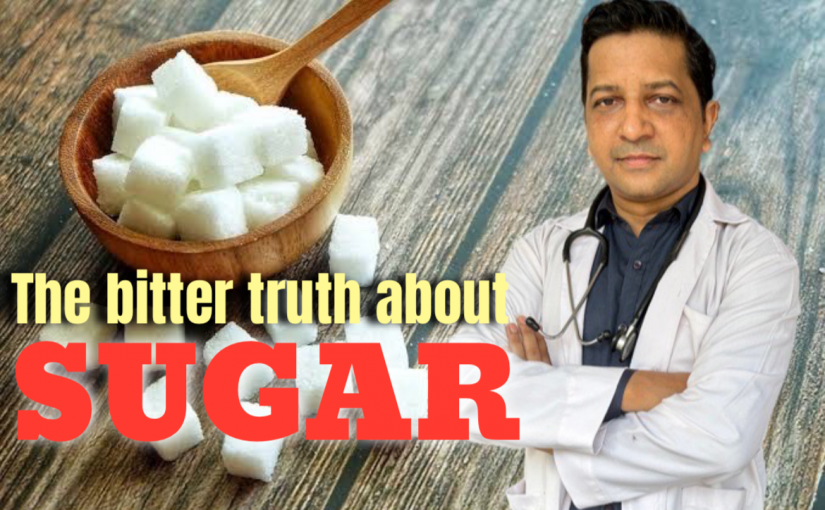The Goan Observer speaks to Dr Amit Dias of the Department of Preventive & Social Medicine at the Goa Medical College to discover the bitter truth about sugar! “We cannot sugarcoat the fact that sugars are bad for our health,” he warns. This week the WHO released an advisory against the use of artificial sweeteners. We learn about this and more in this informative discussion ….
QUESTION: Doctor let us start form the very start what are sugars?
DR AMIT DIAS: Sugars are sweet tasting compounds, naturally present in most plant tissues. There are various kinds of sugars. The crystal sugar we are only too familiar with is extracted from sugarcane and beets. During the refining process they lose all their natural components and we get sucrose, which gives us empty calories. Sucrose is a pure, refined carbohydrate, lacking in natural minerals present in sugar cane or beet. So we get sugars from food naturally and we also have added sugars in our diet. Our liver digests these sugars and converts them to triglycerides and fats. In small quantities it is not a problem, However, large doses in a slew of sweetened hot and cold beverages can result in extra fat in the liver — just like alcohol — and damage it over time.
Q: What are added sugars?
A: These are the culprits. These are the sugars added to food, either at home or by the manufacturers of industrial foods. For example, the table sugar you add to tea or coffee, high fructose corn syrup added to beverages, soft drinks…jaggery, honey, maple syrup, etc, are natural and more wholesome sweeteners but they too come with high carbohydrate calories. It is estimated that added sugars account for half the sugars we consume on a day-to-day basis. When it comes to health hazards, we are not much concerned about the naturally occurring sugars, but about the added sugars that give us empty calories and impact health negatively.
Q: What do you mean when you say empty calories?
A: Empty calories refer to calories that are not nutritionally balanced and do not have any definitive nutritional value. Sometimes people equate “empty calories” to “zero calories.”
This is incorrect. We need calories which are converted in the body to energy which is necessary for survival. However, with the calories we also need other nutritive elements such as proteins, fats, minerals, and vitamins. The empty calorie foods are sugars, candies, soft drinks, alcohol – they provide calories and nil nutritive benefits.
All sugars supply four calories of energy per gram. This is the same for starches and proteins as well. Fat provides nine calories, alcohol provided seven and fiber provided two per gram. Too many calories contribute to obesity as the excess calories are stored as fat. Similarly, an empty calorie, not used for energy will get stored as fat in the body and that is where the problem starts as obesity grows.
Q: Does sugar play a role in our food at all?
A: Sugars do play a role in our food in multiple ways… but there is no way we can sugarcoat the fact that all sugars and especially refined sugars are bad for us. We need to learn to strike a balance. Sugars play a role beyond adding sweetness to food. It can add color as in caramelizing or browning of sugar for cookies, breads, puddings, cakes. This enhances the texture and creates a smooth feel as in frozen desserts. Together with yeast, sugar helps the bread rise. Sugar is also the preservative in jams and preserves. It absorbs the moisture. It improves taste and balances the flavor as for example, in salad dressings and sauces. Sugar can neutralize the acidity of vinegar and tomato and adds to taste. Sugar does play a role — so if you want to reduce sugar intake, either avoid the item that contains it or you can try and reduce the amount of sugar used for each of the processes and get the right balance.

Q: What are the harmful effects of sugars?
A: Sugar is a slow poison. Consuming calories from all sweet sources including sugar increases obesity. Obesity results in ill-health due to the degenerative diseases of diabetes, heart disease, stroke, dementia and other chronic diseases. Non Alcoholic Fatty Liver Disease (NAFLD) is yet another major growing public health problem attributed to sugars. It also impacts the oral cavity of the mouth and teeth by creating an acidic environment in the mouth, speeding up cavities as well as harming the gums and directly or indirectly the other organs of the body…this kind of spread is called “infographic.” The body can rot from the inside out due to our love and addiction for sugary food stuffs! It’s best to minimize sugary intakes in our drinking and eating habits and you will be surprised how less fatty you become!
What is the solution? Should people give up sugar?
No, I am not suggesting that you should give up on Sugars and an occasional dessert that gives you pleasure. I am worried because people are consuming too much sugar- either knowingly or unknowingly and that is bad. You need to cut down on your sugar consumption.
You need to ask yourself the question – how can I cut down on my sugar and you will get the answer yourself. We can swap sweetened drinks for water. Have healthy home-cooked meals, stop overeating, avoid excessive alcohol, and cut down on desserts or their portion size.
We can see the changes in children. There is an epidemic of obesity in schools in the developed world and we see the signs of it in our schools as well. Sugar is a sweet poison- soft drinks, chocolates, and desserts should be taken in moderation. When you tell your child “Do well in your exams and I will give you a box of chocolates” you are glorifying sugars and inculcating a bad habit.
What about artificial sweetners? Are they an alternative to sugars?
No, they are not an alternative. The WHO has rereased an advisory against the use of artificial sweetners- it can cause cardiovascular (heart) disease, type 2 diabetes, obesity and other non commuicable diseases. Understand that seetness is an acquired taste- you can adapt to like your coffee and tea with less sugar over a period of time.
What’s your advise to our readers?
If you avoid everything that can potentially cause you harm to the environment, you will find it difficult to live. You will not be able to breathe the air, drink the water, eat the food. The way forward is to be aware of the harmful effects and make genuine efforts to moderate the intake of items that can potentially cause harm. In addition, also adopt a healthy lifestyle. Get enough sleep, incorporate physical activity, maintain a healthy weight, and adopt a healthy eating pattern.
The bottom line is EAT LESS SUGAR- YOU ARE SWEET ENOUGH ALREADY !!
About the expert:
About the expert: Dr. Amit Dias is a senior faculty at the departmen tof Preventive & Social Medicine at the Goa Medical College he has an MD in Preventive and Social Medicine and a Diploma in tropical Medicine form the London School of Hygiene and Tropical Medicine, UK. He has worked in the area of Non Communicable Diseases.
